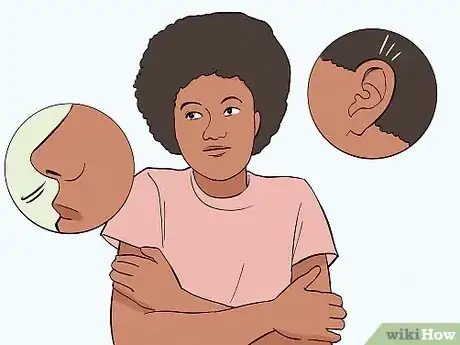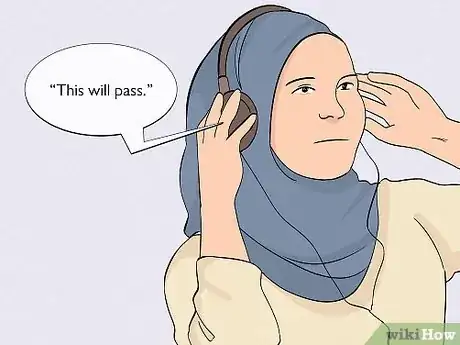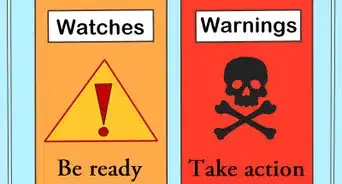This article was co-authored by Natalia S. David, PsyD. Dr. David is an Assistant Professor in Psychology at the University of Texas Southwestern Medical Center and a Psychiatry Consultant at Clements University Hospital and at Zale Lipshy University Hospital. She is a member of the Board of Behavioral Sleep Medicine, the Academy for Integrative Pain Management, and the American Psychological Association’s Division of Health Psychology. In 2017, she received the Baylor Scott & White Research Institute’s Podium Presentation Award and scholarship. She received her PsyD from Alliant International University in 2017 with an emphasis in Health Psychology.
There are 10 references cited in this article, which can be found at the bottom of the page.
This article has been viewed 28,814 times.
Gripping panic or fear can make you feel completely powerless. But, if you work to overcome your fears, you can empower yourself to lead a full and happy life. Start by naming your fear and then facing it head-on without avoiding it or running away. If you still find it hard to break free, consider getting outside help.
Steps
Dealing with Fear
-
1Label your fear to reduce its ambiguity. If your fear is vague, the lack of definition could be making it seem larger in your head. Clearly define your fear in simple terms. This might sound like, “I am afraid of being in a relationship because I think I will be abandoned.”[1]
- You'll need to bring your fear to the surface so you can label it. Talk it through with someone you trust, or journal about it.
- Defining your fear makes it a little less scary. Plus, once you know what it is, you can develop a game plan to overcome it.
-
2Use mindfulness to sit with the emotions brought on by fear. Avoidance is a common response to fear, but it keeps you hostage to what you're afraid of. Rather than pushing away the thoughts and feelings that come along with your fear, accept them and mindfully observe them.[2]
- The next time you feel bombarded by the fear, sit with it. Notice what you're thinking and what's happening in your body. Let these sensations come and go without trying to push them away or avoid them.
- Stay mindful by making sure your thoughts aren't wandering away from the fear. If your mind wanders, bring yourself back to the experience at hand.
Advertisement -
3Consider the worst case scenario. Reduce the power of your fear by thinking about the absolute worst thing that could happen. For instance, if you're frightened of humiliating yourself in public, consider what would happen if you did.[3]
- People might laugh or point, but, eventually, they'll find a new thing to focus on. Chances are, some people might pity you and try to help. Is that really so bad?
- To prevent yourself from spiralling into anxiety during this exercise, do it in the presence of a close friend or family member who can offer support.
-
4Reframe the fear into something more realistic. Identify what you're telling yourself about the fear “I'll embarrass myself” or “I'm going to get mugged if I ride the subway.” Since fear is brought on by automated negative thoughts, identifying those thoughts allows you to challenge the fear portion with rational thought.[4]
- Question how often what you're worried about actually happens. Where is the evidence to support your claim?
- Reframe the fear using the new information: “No one ever laughs at assemblies. They probably won't laugh at me.” and “Thousands of people safely ride the subway each day.”
-
5Take gradual steps to face what's frightening you. To truly overcome your fear, you must face it head on. Slowly, work your way through the different levels of exposure to your fear. With each level, you will gain more confidence to face the next.[5]
- For instance, if you're terrified of riding the subway, you might first look at pictures of people on the subway. Then, watch videos. Next, you might go down into the subway (with a friend) and just stand there for a while. Then, you might board the train, but get off after the first stop. Finally, you might ride all the way to work.
-
6Do something brave. One of the most powerful ways to combat fear is by doing something courageous. Make a list of actions you can take to feel more brave and empowered. Try to do one weekly to slowly gain more confidence in yourself.[6]
- For instance, if you fear sharing your writing with others, you might submit a poem or story to a contest or make it public on a blog.
Coping with Fear in the Moment
-
1Breathe deeply to quell anxiety. If fear has you temporarily paralyzed, activate your body's natural stress response with deep breathing. Draw in air from your nose for about 4 counts. Hold the breath briefly. Then, exhale from your mouth for about 8 counts.[7]
- Repeat this deep breathing exercise for as many cycles as you need to feel calm.
-
2Ground yourself if you lose touch with reality. Fear can make you feel out of touch with the here and now. Ground yourself in the present by reconnecting with your 5 senses. Look around you and find 5 things you can see, 4 things you can touch, 3 you can hear, 2 you can smell, and 1 you can taste.[8]
-
3Ask friends and family for support. Reach out to your loved ones when you are afraid. Talk to them about what you are thinking or feeling. Ask them to help distract you from your fear. Or, make a practical request.[9]
- You might say something like, “I'm afraid to sleep here alone. Will you stay with me?”
-
4Repeat a mantra to remind yourself you're safe and capable. Use a positive affirmation to empower yourself when fear happens. You might repeat statements like, “You're perfectly safe at home” or “This, too, shall pass” to remind yourself you can get through anything.[10]
- If you're afraid of something like asking someone out on a date or speaking in front of a crowd, embolden yourself by saying, “Feel the fear and do it anyway.”
-
5Focus on the good things in your life to boost positivity. Fear can cloud your perspective and make you feel like there's nothing but negativity in your life. Override that by purposely seeking out the good. When you feel fearful, try to identify whatever's going right.[11]
- For instance, if you feel afraid of public speaking, you might list “good” things like, “I'm dressed well. I prepared all last night for this. My friends are in the audience, so I can look to them for courage.”
-
6Spend time in nature to help you feel calm. Go outdoors and get some fresh air to help you calm down when you are afraid. Take your dog for a walk, plan a hike with friends, or take a book to a nearby lake.[12]
Getting Help
-
1Get diagnosed by a doctor. If self-help strategies don't help you to stop living in fear, the next step might be to see a doctor. Make an appointment with your family doctor and explain what's been going on. Ask for a referral to see a mental health provider.[13]
- A psychiatrist or psychologist can diagnose your case and determine if you are experiencing an anxiety disorder like obsessive compulsive disorder or social phobia. A thorough diagnosis can help improve your chances of successful treatment.
-
2Participate in therapy to change your thought patterns. Cognitive-behavioral therapy, which is focused on challenging unrealistic thoughts about your fears, is a great choice for treating anxiety disorders. You might also benefit from exposure therapy, which involves gradual exposure to the situations that frighten you.[14]
- Ask your mental health provider to walk you through the benefits of each type of therapy and help you decide which is right for treating your fear and anxiety.
-
3Ease anxiety and obsessive thoughts with medication. Talk to your doctor to see if antidepressants or anti-anxiety meds are a good choice for you. Depending on the severity of your anxiety, a combined course of therapy and medications may help you stop living in fear.[15]
- Certain chemicals in the brain can become unbalanced and cause feelings of fear to worsen. Psychiatric drugs may help bring these chemicals back into balance so that you can better manage anxiety and live a more satisfying life.
-
4Attend support group meetings. Join meetings with others in your area or online who are dealing with fear and anxiety. In support groups, you can share coping strategies and get encouragement from people who understand what you're going through.[16]
- Ask your mental health provider for recommendations for anxiety support and self-help groups nearby.
-
5Confide in friends and family. Ask those closest to you for support when you feel overcome by fear. You might say, "I'm struggling with crowds. Will you sit with me at the concert?"[17]
- Reach out to your loved ones to help you gain the confidence you need to deal with your fears.
- Whenever possible, try to make specific requests so they have a clear understanding about how they can help.
References
- ↑ https://www.calmclinic.com/anxiety/symptoms/fear
- ↑ https://www.takingcharge.csh.umn.edu/enhance-your-wellbeing/security/facing-fear/how-deal-chronic-fear-and-anxiety
- ↑ https://www.nhs.uk/Conditions/stress-anxiety-depression/Pages/overcoming-fears.aspx
- ↑ https://www.helpguide.org/articles/anxiety/phobias-and-irrational-fears.htm
- ↑ https://www.helpguide.org/articles/anxiety/phobias-and-irrational-fears.htm
- ↑ https://www.inc.com/rhett-power/10-ways-to-live-a-more-courageous-life.html
- ↑ https://www.helpguide.org/articles/anxiety/phobias-and-irrational-fears.htm
- ↑ http://www.drcordes.com/blog/2014/11/24/easy-grounding-exercises-to-calm-the-nervous-system
- ↑ https://www.calmclinic.com/anxiety/symptoms/fear
- ↑ https://tinybuddha.com/blog/4-powerful-mantras-to-help-you-deal-with-fear-and-anxiety/
- ↑ https://www.takingcharge.csh.umn.edu/enhance-your-wellbeing/security/facing-fear/how-deal-chronic-fear-and-anxiety
- ↑ https://news.stanford.edu/2015/06/30/hiking-mental-health-063015/
- ↑ https://www.nhs.uk/Conditions/stress-anxiety-depression/Pages/overcoming-fears.aspx
- ↑ https://www.mentalhealth.org.uk/publications/overcome-fear-anxiety
- ↑ https://www.health.harvard.edu/blog/mindfulness-meditation-may-ease-anxiety-mental-stress-201401086967
- ↑ https://www.mentalhealth.org.uk/publications/overcome-fear-anxiety
- ↑ https://www.mentalhealth.org.uk/publications/overcome-fear-anxiety
About This Article
If fear is holding you back from what you really want to do, there are a few ways you can help yourself overcome it. Take gradual steps to face your fears so you won’t get overwhelmed by them. For example, if you’re worried about joining a sports club, you could watch a game from the sidelines first, then talk to the coach about joining, then go to your first practice the next week. You can also talk to your friends or family members about what you’re feeling so they can support you and boost your confidence. When you start feeling anxious, try taking some deep breaths to help you relax. If you notice any negative thoughts, try reframing them as positives. For instance, if you think, “I’m not good at talking to new people,” remind yourself that it’s a great opportunity to practice your social skills. For more advice from our co-author, including how to be more mindful when you’re afraid, read on!













































































Medical Disclaimer
The content of this article is not intended to be a substitute for professional medical advice, examination, diagnosis, or treatment. You should always contact your doctor or other qualified healthcare professional before starting, changing, or stopping any kind of health treatment.
Read More...